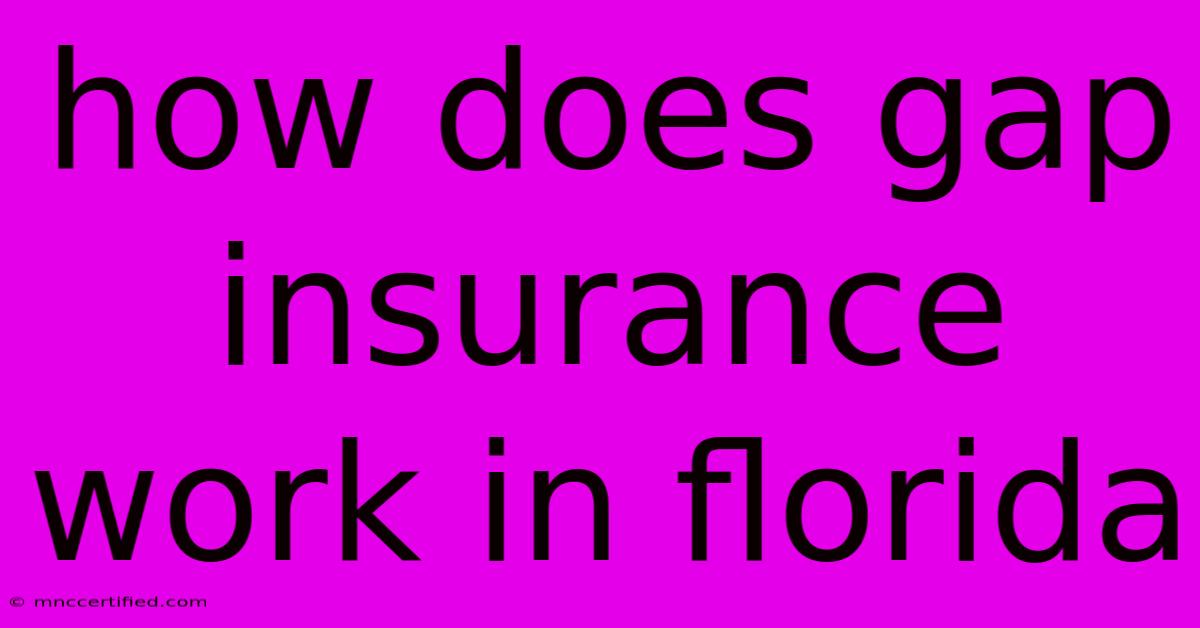How Does Gap Insurance Work In Florida

Table of Contents
How Does Gap Insurance Work in Florida?
Are you buying a new car in Florida? If so, you've probably heard of "gap insurance." But what is it, and do you really need it?
In this article, we'll break down gap insurance in Florida, explaining exactly how it works and whether it's the right choice for you.
What is Gap Insurance?
Gap insurance is a type of insurance that covers the difference between your car's actual cash value (ACV) and the amount you still owe on your car loan.
Here's a simple example:
- You finance a new car for $30,000.
- After three years, your car is involved in an accident and declared totaled.
- Your insurance company determines the ACV of your car to be $18,000.
- Gap insurance would pay the remaining $12,000 to cover the difference between your loan balance and the ACV.
Why is Gap Insurance Important in Florida?
Cars depreciate rapidly, especially in the first few years. In Florida, where weather conditions can accelerate depreciation, this can leave you with a hefty balance on your car loan even if your car is totaled. Gap insurance can help you avoid this financial burden.
Types of Gap Insurance in Florida
There are two primary types of gap insurance available in Florida:
- Dealer-Offered Gap Insurance: This is typically offered at the time of purchase and is bundled with your car loan. While convenient, it can often be more expensive than other options.
- Stand-Alone Gap Insurance: This type of gap insurance is purchased separately from your car loan. It can be more flexible and often comes with lower premiums.
When is Gap Insurance Worth It in Florida?
Here are some scenarios where gap insurance could be beneficial:
- Financing a New Car: New cars depreciate quickly, making gap insurance a smart choice in the early years of ownership.
- Large Down Payment: If you put a small down payment on your car, you'll have a larger loan balance to cover, making gap insurance more relevant.
- Long Loan Term: A longer loan term means more time for your car to depreciate. Gap insurance can help protect you from potential losses.
- Living in Florida: As mentioned, Florida's climate can accelerate depreciation, making gap insurance even more important.
How to Decide if You Need Gap Insurance in Florida
To determine if gap insurance is right for you, consider:
- Your Car Loan: How much do you owe on your car loan?
- Your Car's Value: What is your car's estimated actual cash value?
- Your Financial Situation: Can you afford to cover the difference between your loan balance and the ACV if your car is totaled?
It's always a good idea to talk to your insurance agent or a financial advisor to get a personalized assessment.
Conclusion
Gap insurance can be a valuable tool in Florida to protect yourself from financial hardship in the event of a totaled vehicle. While not necessary for everyone, it can provide peace of mind, especially if you've financed a new car with a large loan balance. By understanding how gap insurance works, you can make an informed decision about whether it's the right choice for you.
Remember, protecting your financial future is crucial. Consider all your options and make a smart decision based on your individual needs.

Thank you for visiting our website wich cover about How Does Gap Insurance Work In Florida. We hope the information provided has been useful to you. Feel free to contact us if you have any questions or need further assistance. See you next time and dont miss to bookmark.
Featured Posts
-
Watch Duke Vs Army Free Live 11 8 24
Nov 09, 2024
-
Mbappe Declines France Selection Report Claims
Nov 09, 2024
-
Velox Insurance Stone Mountain Georgia
Nov 09, 2024
-
Grammy 2025 Nominees Full List
Nov 09, 2024
-
Why Is Fidelity Investments Calling Me
Nov 09, 2024